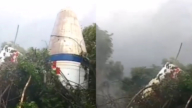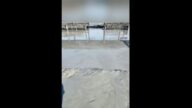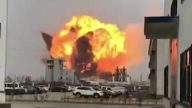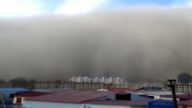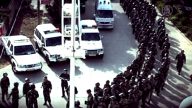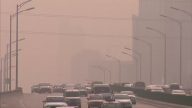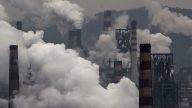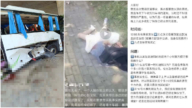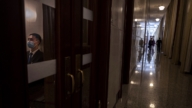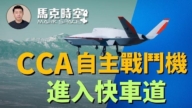【新唐人2012年10月20日訊】大陸環境保護部在一份報告中承認,中國核安全問題「情況不容樂觀」。但從9月開始,環保部密集通告多個省市,批准了各項核電項目。業內人士認為,這是中共當局重新啟動核電項目的跡象。令專家們對此感到憂慮。
9月份起,環境保護部批准延續北京、上海、江蘇、大連等多地,民用核安全設備製造許可證﹔和批准民用核安全設備焊工焊接操作工資格﹔另外,這個月10號,還核可了116家聘用單位的778名通過「民用核安全設備無損檢驗考試人員」的資格。而,10月25-26號,第二屆「在建核電廠經驗回饋交流會」,將在杭州召開。業內人士認為,這些都是核電項目「重啟」的一個明顯信號。
大陸媒體報導,環保部16號披露,根據中央《十二五核安全規劃》,在2015年前,將投資近800億人民幣來加強核設施安全。
「中國核安全信息交流中心」發起人何岸泉分析,重啟核電項目的原因,一是因為《十二五規劃》是胡溫執政期制訂的目標,為完成政績而繼續按計劃發展。另外,也是中共當局挽救中國面臨經濟危機的一項措施﹔拉動以核電為龍頭的相關企業,保持中國經濟成長。
「中國核安全信息交流中心」發起人何岸泉:「第三點,大家都知道中國現在很多人認為是權貴資本主義,很多央企和國企,在有權有勢的家族的壟斷和操控下,為了獲得經濟利益,他們要開展很多項目,那麼核電就是他們奪取利益的手段之一。」
何岸泉指出,2010年,中央委員、「中國核電集團」黨組書記康日新,由於貪污了7千萬歐元被「雙開」。
何岸泉:「為甚麼要提這件事情就是說明,在中共一黨專政的體制下,包括核電部門這些官員,他們不例外的保持了中共官員的貪污、腐化、瀆職、越權這個特色,在貪官的情況下他能夠為核電事業做出甚麼貢獻呢?」
日本「福島核事故」發生之後,中共國務院在去年(2011年)3月,出臺核電「國四條」,要求進行全面安全大檢查。
另一方面,今年6月,有關「核安全與放射性污染防治」的報告中提出,核安全與放射性污染防治面臨挑戰。
報告中說,中國核電具多種反應堆型、多種技術、多類標準並存的局面,給安全管理帶來一定難度﹔而運行和在建核電廠預防和緩解嚴重事故的能力仍需進一步提高﹔並且,科技研發需要加強﹔應急體系需要完善﹔監管能力需要提升。
何岸泉:「各種設計的都有,就造成一個隱患就是,無法在管理上面、在經驗上面,得積纍足夠的經驗,來保證核建反應堆的這個現場的運行,我們知道成熟的一個安全的投資項目,它必須在同一個項目上面積纍經驗,不同的設計,互相之間的經驗,它無法共享。」
何岸泉認為,這將造成資金、管理、研究人員實力的分散,也導致核能安全的隱患。
何岸泉:「管理人才跟不上。在管理、操控核電站運行的過程當中,一定會發生非專業人員,在專業的崗位上面進行工作,或者專業人員培訓不夠,又是一個很大的隱患。核電站龐大的專業人員,必須具有非常高的專業素質﹔中國不具備這個條件,這樣搞核電大躍進,當然會造成非常大、非常大的隱患。」
目前,歐美國家已經開發新的替代能源。何岸泉指出,中共當局如果仍然一意孤行,不能及時的向先進國家學習,墨守成規,最終倒楣的必然是整個大陸百姓。
採訪編輯/梁欣 後製/鍾元
The CCP invests 80 billion Yuan in nuclear safety but the situation is still “challenging”
Previously, China’s Ministry of Environmental Protection (SEPA)
acknowledged in a report that the overall situation of China’s nuclear safety is challenging.
However, since September, SEPA has intensively issued
approvals of nuclear plant projects in many cities all over China.
As believed by professionals, this suggests that the CCP authority
will restart its nuclear programs, which causes experts concern.
After September, SEPA extended permits of nuclear safety
equipment production for civil use in cities of Beijing, Shanghai, Dalian, and Jiangsu province, among others.
SEPA also approved welder permits of nuclear safety
equipment for civil use.
Furthermore, on October 10th, SEPA certifies 778
non-destructive testing technicians for 116 employing unites.
On October 25th, the Second Experience Sharing Seminar
of Nuclear Power Plants on Construction will be held in Hangzhou.
Professionals believe that these are clear signals that
nuclear plant projects by the CCP authority are beginning again.
According to some Chinese media, SEPA revealed
on October 16th that the 12th Five-year Plan of nuclear safety
requires that 80 billion Yuan will be spent improving
safety protection of nuclear equipment before 2015.
Founder of Information Center for China’s Nuclear Safety,
He Anquan, remarked that since the 12th Five-year Plan
was worked out during Hu Jintao and Wen Jiabao’s era,
the restart of nuclear programs is to make some achievements following the original, pre Hu, plan.
He also said this is a move against China’s economic
crisis by the CCP and they attempt to sustain China’s
economic development by motivating enterprises related
to the nuclear power industry.
He Anquan, Founder of Information Center for China’s
Nuclear Safety: ”In addition, we all know that many Chinese define China’s economy as “Crony Capitalism.”
Most state-owned companies are under the control
of influential clans of the CCP leaders.
To make more profits, they need many new projects.
Nuclear power plant projects serve this goal as well.”
As an example, He Anquan mentioned former CCP Central
Committee member, Party Secretary of China National Nuclear Corporation, Kang Rixin.
He was expelled from the CCP and removed from his position
in 2012 because he embezzled over 70 million Euros.
He Anquan: ”The story of Kang Rixin tells us that, under
the CCP’s one-party dictatorship,
officials in the nuclear power industry are inevitably guilty of corruption,
dereliction of duty and power abuse like other CCP officials.
Under such a situation how can you expect them
to make contributions to the whole industry?”
After Japan’s Fukushima nuclear accident, the CCP State
Council announced “four principles” in March 2011,
which requires the entire nuclear power industry
to make thorough safety inspections.
In June, 2012, an official report of SEPA pointed out that
the problem of nuclear safety and preventive treatment of radioactive pollution is still challenging.
The report stated difficulty of safety management lies
in the fact that there exist various types of nuclear reactors,
nuclear power techniques, as well as operation standards,
and that the capability of preventing or handling serious accidents is still inadequate.
Furthermore, the research and development capability,
emergency response system, and regulatory system all need to be improved.
He Anquan: ”Various designs of nuclear plants
bring up a problem.
It is important to accumulate enough experience
to operate a nuclear plant safely.
We all know that a safe and mature project results from
a lot of experience from repeat practice.
However, the experience from different nuclear plant
projects cannot be shared.”
He Anquan believes that different project designs scatter
the capital, management and research, which is the hidden danger in nuclear safety.
He Anquan: ”One problem is the shortage
of professional workers.
So in managing and operating a nuclear plant, there must be
cases where nonprofessional or under-trained employees
have to work at a professional capacity.
This is a huge hidden danger.
You have to have a large staff with high professional
standards run those the nuclear plants.
Currently this condition is not fulfilled in China.
Such a ‘Great Leap Forward’ in nuclear plant construction
will definitely bring very, very dangerous safety problems into the mix.”
So far the western countries have been developing new
resources to replace nuclear plants.
He Anquan warned that if the CCP authority doesn’t learn
a lesson from developed countries and
stick to its original plan regarding nuclear plants,
all Chinese people will inevitably pay for this mistake.


